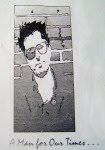Off topic: LA underground radio
As I would call it, the lineage of hip radio in LA was something like this:
- KFWB with B. Mitchell Reid, mid 60s, nights (they went all-news in the late mid-60s)
- KPPC -- broadcast out of a church basement in Pasadena, arguably the hippest station in LA history, birthplace of Radio Free Oz and the Firesign Theatre. Reid showed up there, too. Another key figure was Tom Donahue, as well as Steven Clean (Segal, not the actor). The license eventually ended up as KROQ around a decade later but the hip part of its history ended in '71.
- KMET -- Once again, Reid was involved, this time, as the guiding light. It turned 'underground' in 1969 and for a number of years was actually close to worthy of the name, even though it was owned by a media conglom. The Firesign were a frequent presence, DJs were encouraged to be irreverent but eclectic -- it was common to segue from edgy then-contemporary rock to cool jazz or Billie Holiday or outlaw country. But by the second half of the 70s, KMET had become a lot more conservative, becoming, for a lot of folks, the archetypal dinosaur rock station, playing a safe blend of mainstream 'classic rock' which they continued to play for many years hence.
- KROQ -- In the late mid-70s, around '77, when the once-cutting-edge Steven Clean was saying he'd quit if KMET ever made him play any more of that new music like the Sex Pistols -- the moment is burned into my memory because he was still a sentimental favorite, but I was really excited by the new music scene -- KROQ was struggling to make a name for itself at the far edges of LA pop concsiousness. One of their key DJs at the time was the legendarily oft-fired Jimmy Rabbit (AKA Eddy Payne) who was there for various shifts from '76-'78. He was notorious for drinking his way through his afternoon shifts. He would occasionally tell listeners to keep an eye out for him as he hitchhiked home from Pasadena to Santa Monica, since the courts had relieved him, once again, of his driver's license. There were outlandish stories about some of his RTD bus rides, too. KROQ called itself "the rock of the 80s" several years before that decade and played a not always coherent blend of punk, heavy rock, and the outsider synth pop then known as new wave. In 1979, program director Rick Carrol came onboard and transformed the station into a formatted, commercial station. excluding the 'dinosaur' rock elements for the most part, mostly eschewing anything actually punk (exept for the historical oddity of Rodney Bingenheimer's late Sunday night shows) and began focusing on British mainstream synth pop and its American imitators like Missing Persons, et al, as well as carefully targeted, guitar-oriented safe 'new wave' like the Police, Romantics, and U2.
- KCRW, KXLU, KSPC, KUCI, KPCC [for a while], and other college stations - in the 80s and into the 90s, the only beacons of hipness of any kind on the radio seemed to be the college stations. Each had its own niche, which they served with varying degrees of success.



1 Comments:
Glad that so many people still mention those early days of KPPC and KPFK. Some forty years later The Firesign Theatre is still active and planning a concert this April in
Monterey.
Post a Comment
Subscribe to Post Comments [Atom]
<< Home